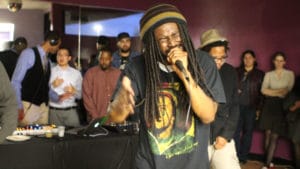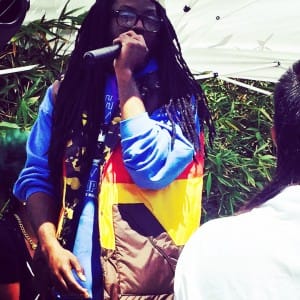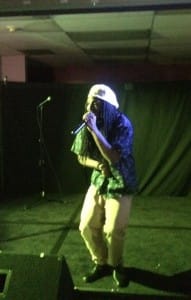Come see at the Matatu Festival of Stories on Thursday, Sept. 24
by The People’s Minister of Information JR
Donte Clark, otherwise known on the streets of his hometown of Richmond as Tay, is helping to lead a movement of spoken word artists in a small city known for Black on Black crime and environmental disasters.

Donte Clark is an up and coming Bay Area star on the national spoken word network, and it is time that we, our region, show its proper respects to a young brotha who has worked hard to be where he is. Check him out in his own words.
M.O.I. JR: How did you get into writing poetry?
Donte Clark: I first knew I was gifted with stringing words and ideas together in the fifth grade. A lot of times I did not care much for reading but cared more for hearing stories. I love to write book reports or any writing assignment. That was my favorite part in any English class. Telling a story came to me easy.
I knew I was to pursue writing when I embarked upon my last year of high school. I didn’t want to pursue a college degree, nor work a 9-5 job. Sports was never my thing, so all I had was the streets and my experiences to write about. Leaving the streets, I picked up the pen.
I wrote my first poem at 17 years old – inspired by a girl I saw for the first time and thought I was in love. Wrote it and showed it to people and they thought I stole it from the internet.
Before this poem, all of my rap lyrics were of pain and hate. This is when I pursued love through poetry.
All I had was the streets and my experiences to write about. Leaving the streets, I picked up the pen.
M.O.I. JR: Who were some of the early poets and rappers that you liked? Why did you like them?
Donte Clark: Growing up, I listened to whatever came on the radio. I say a few had major influence on my art as a performer and writer today: Bone Thugs-n-Harmony for the flow and harmony that springs from their vocals, Tupac Shakur from his subject matter and heart for bettering his community through his stories of struggle and drive to educate through pain.
I love listening to Anita Baker and any other soul musician because they depict pain so beautifully. Everything I talk about is pain and triumph. Amir Sulaiman, Chinaka Hodge, Jasmin Mans, Black Ice and a bunch of other writers.
M.O.I. JR: How has being from Richmond influenced how you do your craft?
Donte Clark: Being from Richmond – I coined the land as “Richmond get up on ya” – has influenced everything I write. I tell the stories of the people that I stood next to on the street corner, watched walk past me or the number of conversations held under street lights.
It’s that Southern drawl in my words, the cadence in how I speak, the slang and definitely the flow of my words with how I move. Richmond get up on ya. Not too many writers I know deliver the stories from my city the way I capture it, so I feel compelled to be RAW with how I present poetry.
M.O.I. JR: Can you tell me a little bit about the spoken word theater program that you run?

We facilitated writing workshop guided by writing prompts and exercises. From these writing workshops, we enhance performance techniques, then cultivate community in performing for the stage. Poems led to shows, shows led to writing theater pieces, which led to a documentary. Now we’re here.
M.O.I. JR: With a lot of your siblings being in the streets, what made you want to be an artist?
Donte Clark: In the fifth grade I recited a rap I stole from my brother. I busted those few lines from his song in front of a small audience. They showed me a lot of love. I was a shy kid so all of this attention was overwhelming but felt really good.
I started borrowing other rappers’ lyrics, pretending they were mine. While doing this, I learned how to write and flow in a way that was universal.
Seeing that the streets wasn’t going to get me further in life spiritually or socially, I pursued writing to help better my community like Pac tried to. OGs or elders from the block told me I might be the one to save lives.
That was powerful because most of them were a part of the life lost in my city. So I had to honor that. My cousins, brothers, uncles, friends and pops been back in forth from county jail, state and federal penitentiary. Don’t want that to be for their children that’s left behind.
Seeing that the streets wasn’t going to get me further in life spiritually or socially, I pursued writing to help better my community like Pac tried to. OGs or elders from the block told me I might be the one to save lives.
M.O.I. JR: I just watched a beautiful film called “Romeo is Bleeding,” where you and the sister Harmony led a team of writers, poets, actors and actresses on film in transforming Shakespeare’s “Romeo and Juliet” into a masterfully told tale about life and love in current day Richmond.
What made you get involved in the project? Then what made you allow a film crew to film your creative process as well as your emotional ups and downs in your lives at the time?
Donte Clark: My old head Rueben Morgan suggested to Molly and myself to put on “Romeo and Juliet” in front of a Richmond audience. I was reluctant at first. After consideration, we seized this opportunity to address the gun violence between our neighborhoods.
In “Romeo and Juliet,” it’s not disclosed why one family is at odds with the other – like most folks in my city don’t know why they are at odds with the other side. So we wanted to provide context to this narrative, giving a background story for why our hoods of Black and Brown youth fall to the gun, taking it back to the enslavement of our people.
Most importantly, showing the older generation that they are just as responsible for our deaths because we are their children who inherited their drug habits and degrading behaviors, but if the adults will not take responsibility, then we have no excuse either because we still have a choice to choose to be different.

M.O.I. JR: What is next for the documentary “Romeo is Bleeding”?
Donte Clark: Next we are working on a curriculum surrounding the documentary to be produced and taught inside of after-school programs, juvenile detentions and most definitely inside of schools that are already mandated to teach “Romeo and Juliet.”
M.O.I. JR: What is next for your writing, acting and spoken word career?
Donte Clark: What’s next for me is to keep writing. I have a ton of unreleased music and countless ideas for movie projects and spoken word pieces.
But I feel like after participating at a few theater projects and music venues, I will mostly continue spoken word. It’s the freest form I’ve come across. Need nothin’ but a heart, deep thought, pen and pad. Then Go.
M.O.I. JR: How could people stay up with what you are doing?
Donte Clark: Right now I’m only active on Instagram under donblak/donte clark. Other than that, by phone or catch me when you see me. I like to be close enough to be touched but distant enough to slip away.
Not looking for a huge following or praise; that comes with the territory. I just want to create, put it out there and help people in real life.
The People’s Minister of Information JR Valrey is associate editor of the Bay View, author of “Block Reportin’” and “Unfinished Business: Block Reportin’ 2” and filmmaker of “Operation Small Axe” and “Block Reportin’ 101,” available, along with many more interviews, at www.blockreportradio.com. He can be reached at blockreportradio@gmail.com.





